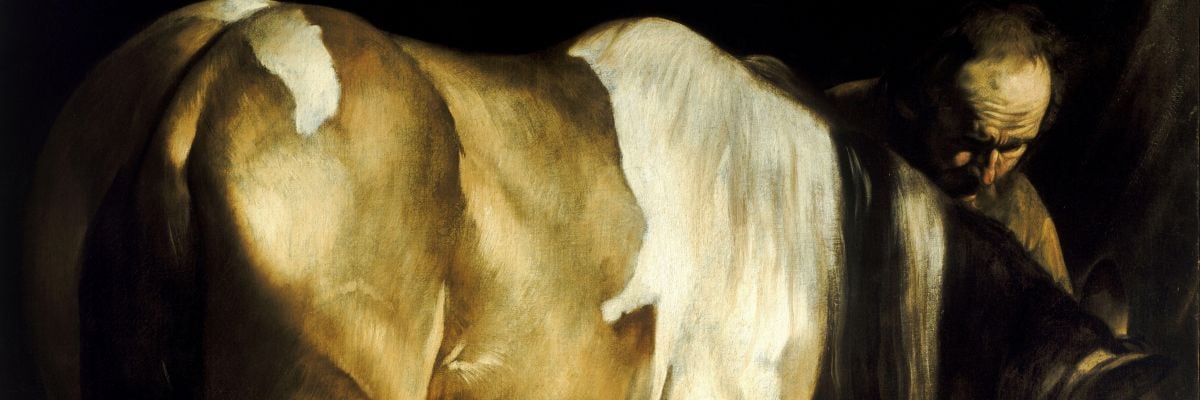
Paul first came to Thessalonica—modern Salonika—around the year 50 (early on in the course of his second apostolic journey). It was one of the most important cities in the Roman province of Macedonia. Its very busy port, its strategic position on the main highway between Rome and its provinces in the East, and its position on the route from Thrace to Acadia meant that many people, mainly Greeks, gravitated to Thessalonica in search of employment; it had a sizable Jewish community, with its own synagogue. Zealous as ever, Paul spoke in this synagogue on three consecutive sabbaths, explaining that Jesus was the true Messiah, in whom the Old Testament prophecies found their fulfillment. Only some of these Jews accepted the Gospel, but many Greek proselytes became Christians as well as “not a few of the leading women” (Acts 16:25-17:4).
The apostle was immediately persecuted and had to flee the city by night, leaving his catechetical work unfinished. As soon as he reached Athens he sent Timothy back to Thessalonica, and Timothy soon returned with good reports. By this time Paul was already in Corinth and from there, happy to hear of the Thessalonians’ firmness in the faith and of their affectionate regard for himself (despite what detractors were saying about him), he wrote to them to console them and clarify some points of doctrine; two points, particularly the lot of those who die before the Parousia [the second coming of the Lord] and the disruption caused by those who refused to work and constituted a burden on the Christian community in that city.
1 Thessalonians
After thanking God for the steadfast faith of the Thessalonians, Paul vigorously defends the supernatural character of his mission. Contrary to what some people were alleging out of greed and vanity, he had brought them the Gospel “not only in word, but also in power and in the Holy Spirit and with full conviction” (1:5): “we speak, not to please men, but to please God who tests our hearts” (2:4). A proof of this is the fact that during the time he spent among them he worked with his own hands, to avoid being a burden on them (2:9-10). Therefore, he insists on the mutual love they should have for one another and everyone’s responsibility to pull his weight, to do his daily work and obey those whom God has placed over him.
Finally he touches on the Parousia and on what happens to those who have already died when the Parousia comes. The Thessalonians were in no doubt about the resurrection of the dead, nor did they think that the Parousia was imminent; but they wanted to know what the position of the dead would be, for they thought that those who were still alive at the time of the Parousia would have some kind of privileged position. Paul sets their minds at rest by assuring them that everyone—the dead and the living—will share in the Lord’s triumphant cortege because “we who are alive, who are left until the coming of the Lord, shall not precede those who have fallen asleep” (4:15).
2 Thessalonians
The Thessalonians were very happy with the first letter, but they began to ask themselves further questions, which left them uneasy. Paul had not told them anything about when the Parousia would happen, and some of them, who were perhaps naturally nervous or impulsive types, were making out that the Parousia was in fact imminent. This sort of thinking made them disinterested in things around them.
This is the new theme of Paul’s second letter, written some months later, a letter which is a logical extension of the first. A maritime city like Thessalonica, with a sizable proportion of unemployed and idle people, was just the sort of place where gossip, intrigue and false rumors thrived. And naturally, among recent converts to Christianity, there were some people who felt disinclined to do a solid day’s work and more inclined to speculate about the future and discuss predictions than to take Paul’s teaching seriously and follow the example of his hardworking and orderly life.
In this letter, the apostle, after encouraging them to remain steadfast in the faith, goes into more detail about “the day of the coming of the Lord.” He tells them that it is not around the corner, for first two main things must happen: the great rebellion and the advent of Antichrist. These have not happened yet, so why should they make the mistake of thinking that the Parousia is imminent? We do not know who or what this Antichrist is, or what power restrains him: Paul reveals nothing about this. All he does is warn them not to be impressionable and not to be alarmed by mere rumors, because this could undermine their perseverance in the faith. “If any one will not work, let him not eat” (3:10), he tells them; they should follow the example he himself has given them. This shows that it is wrong to say Paul thought that the Lord’s coming, the end of the world, was imminent, and that he spread this false idea among the early Christians. What these letters do contain is an echo of Jesus’ prophecy about the destruction of Jerusalem (Luke 17 and Matt. 24) and of the persecutions the Church will experience until the end of time.


